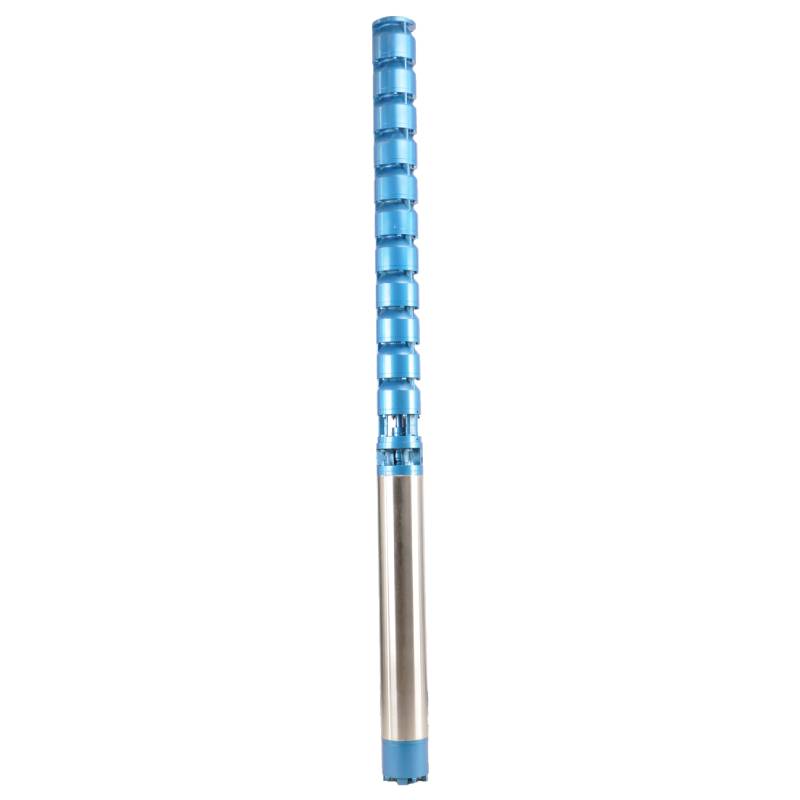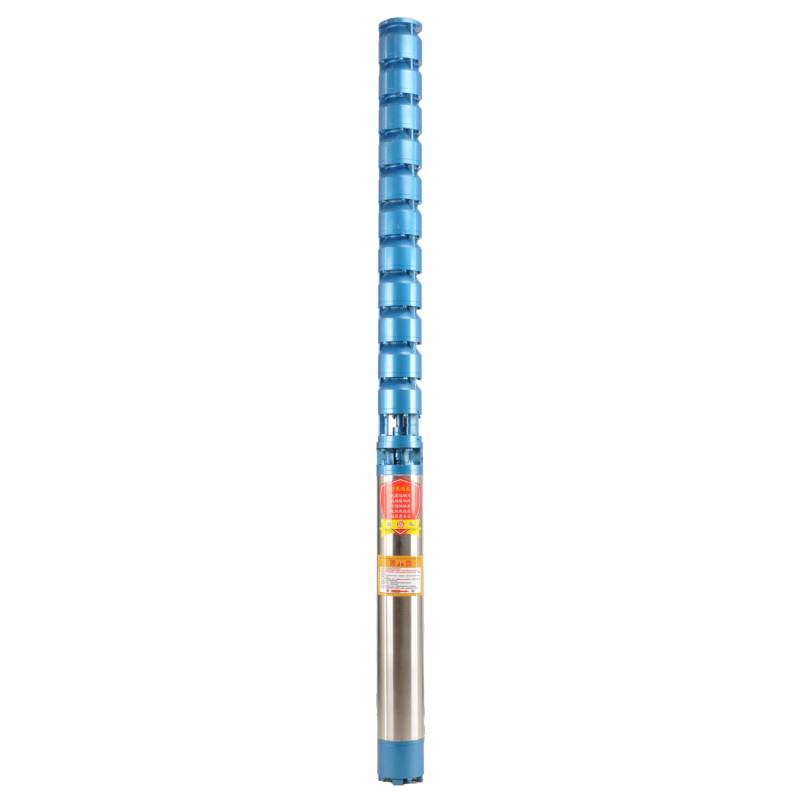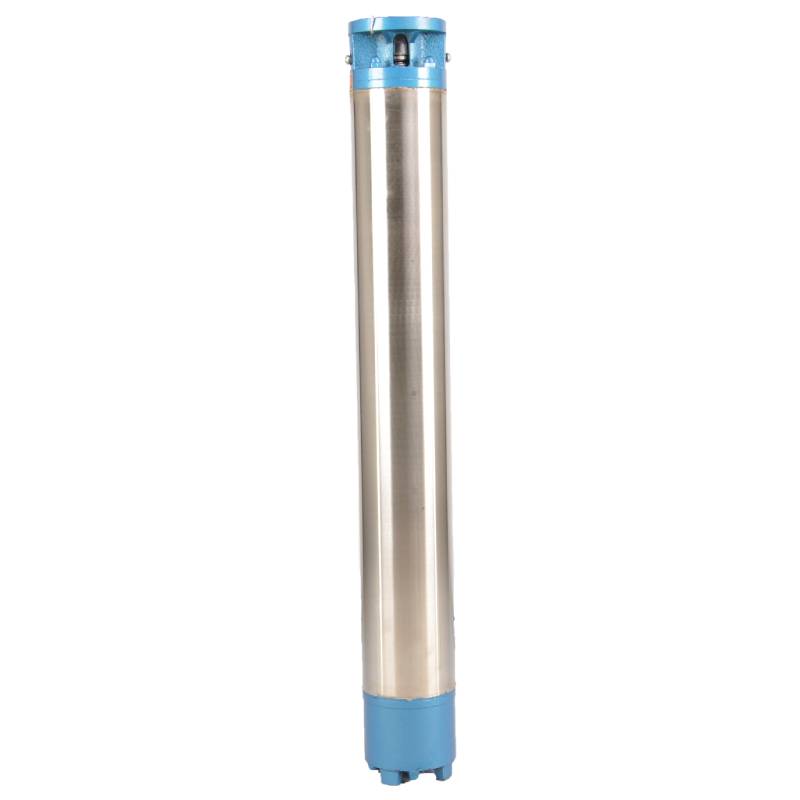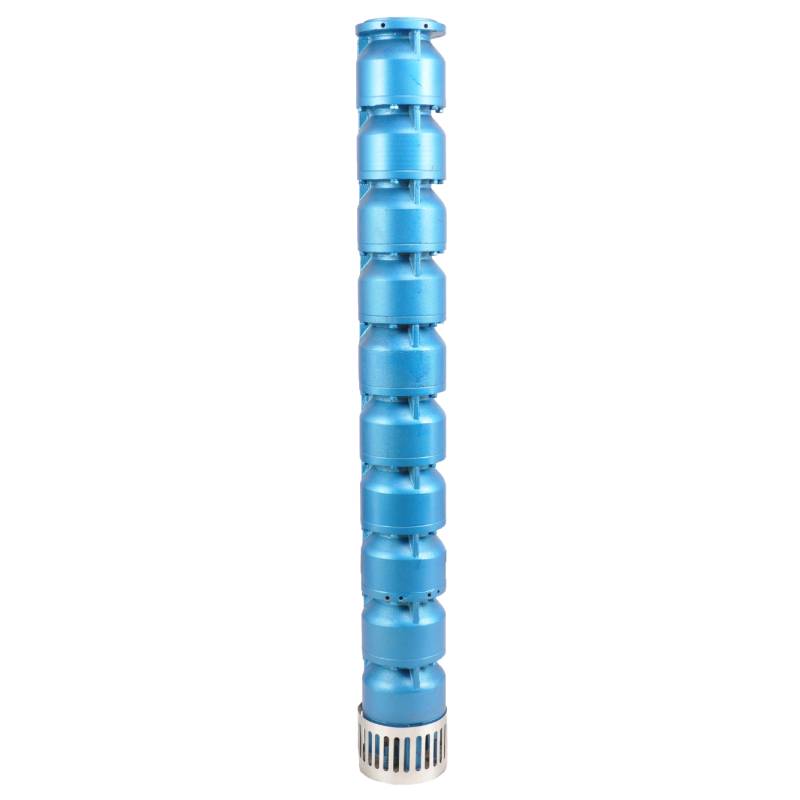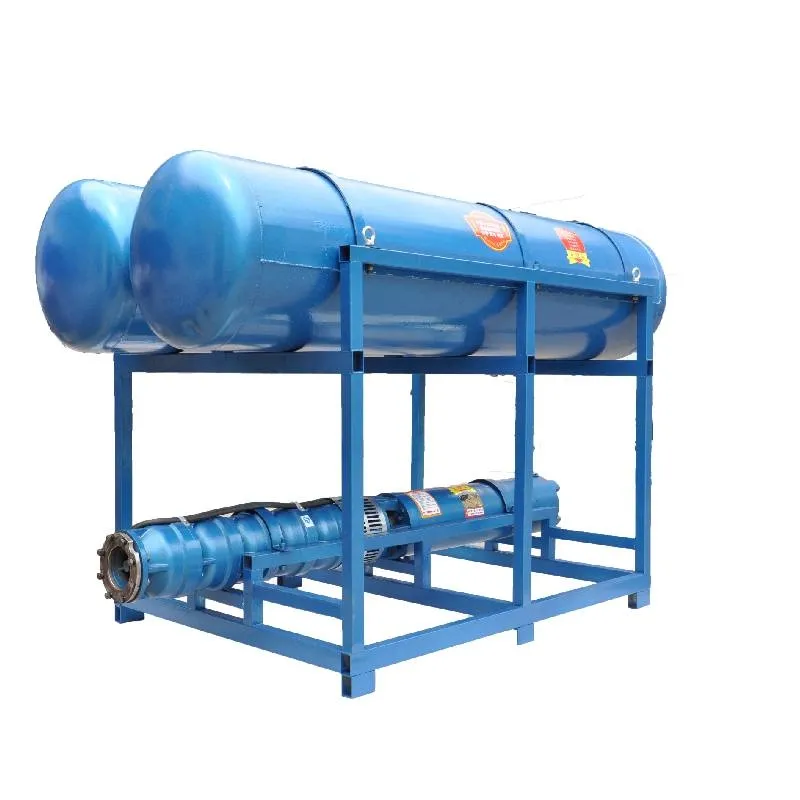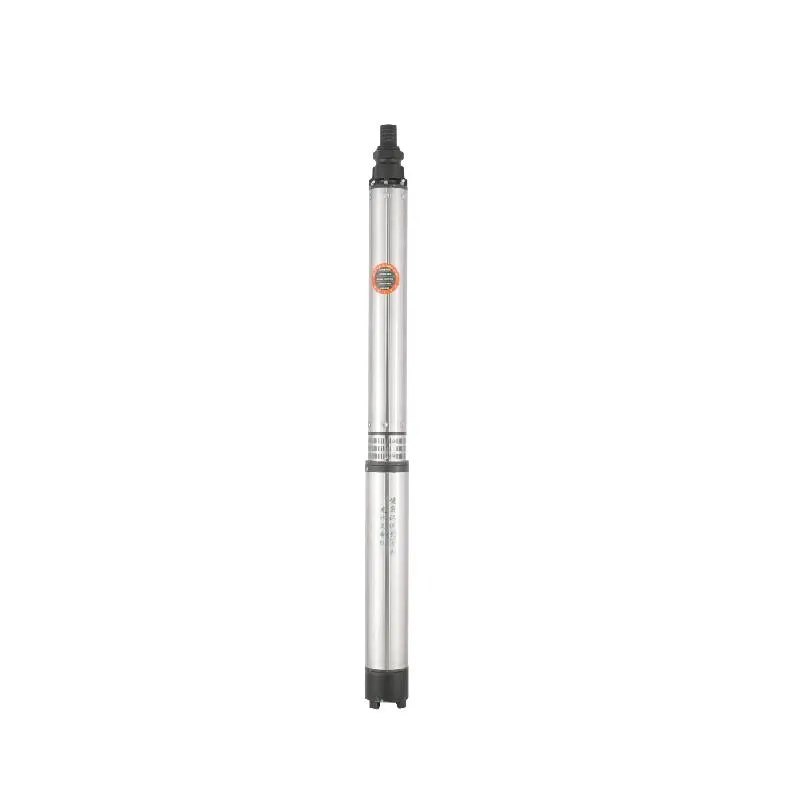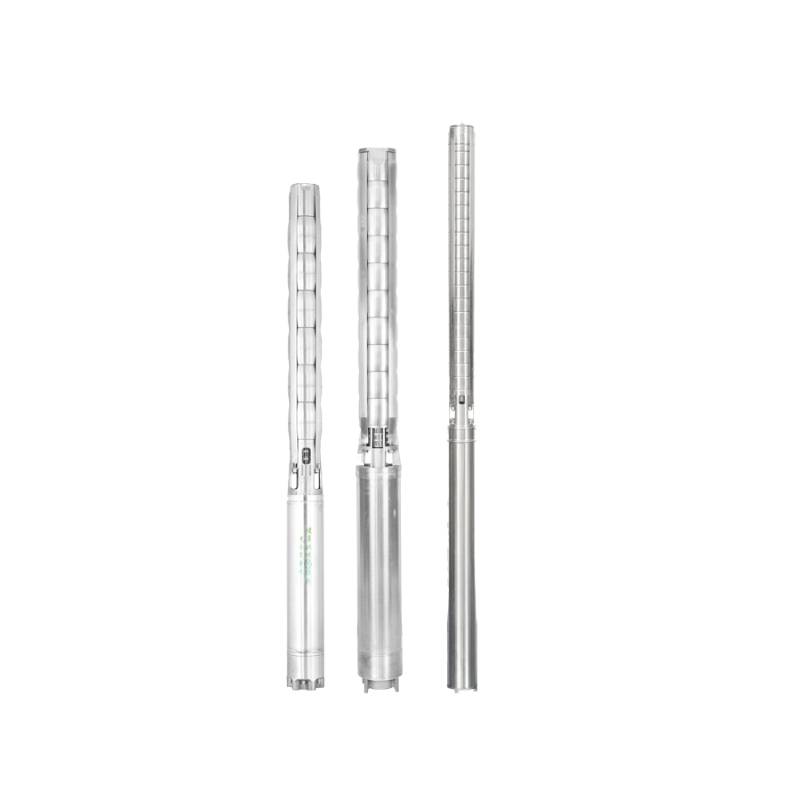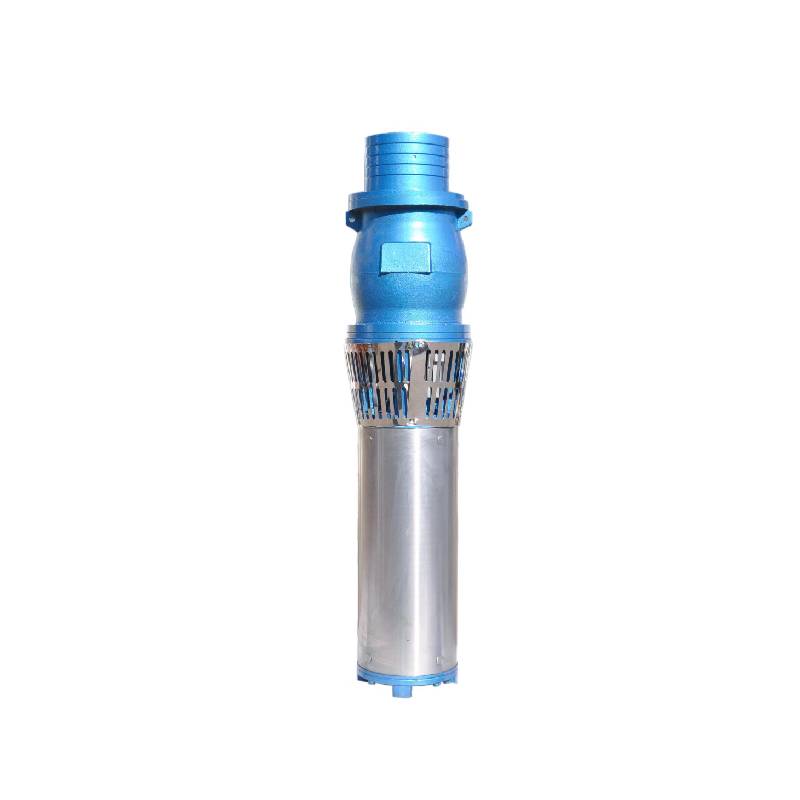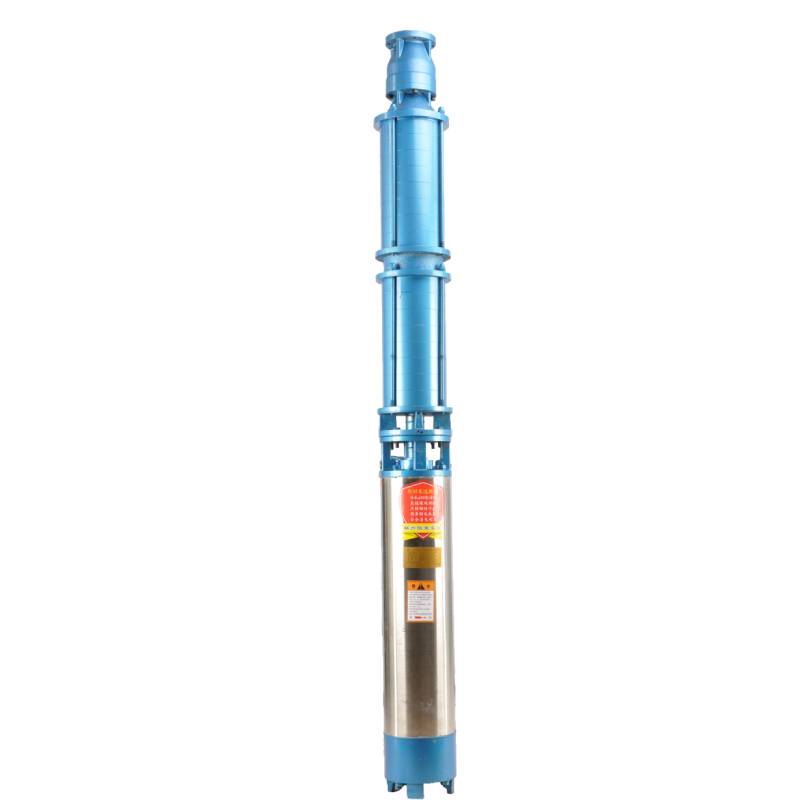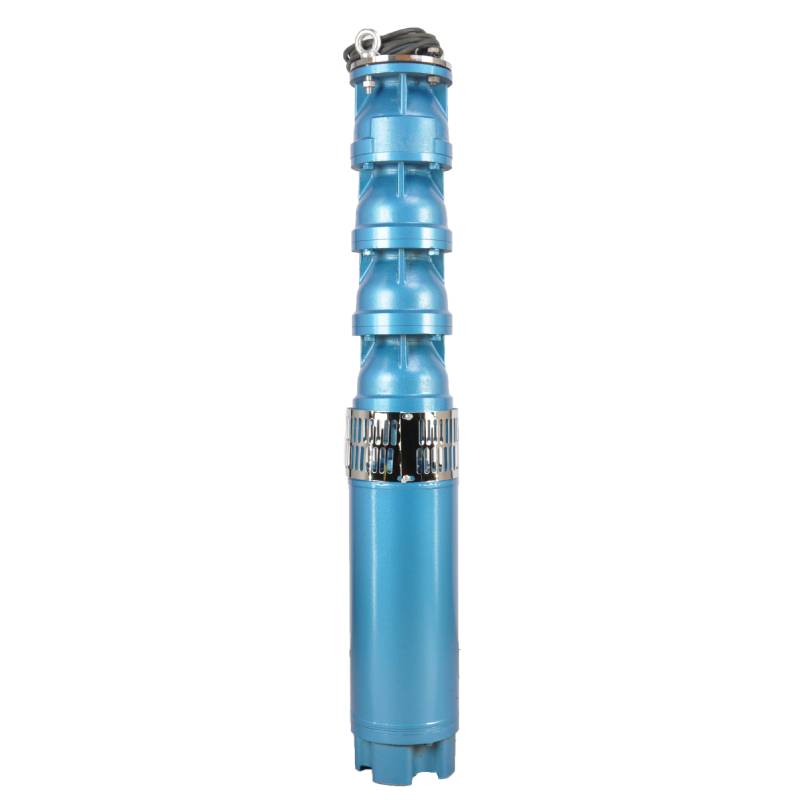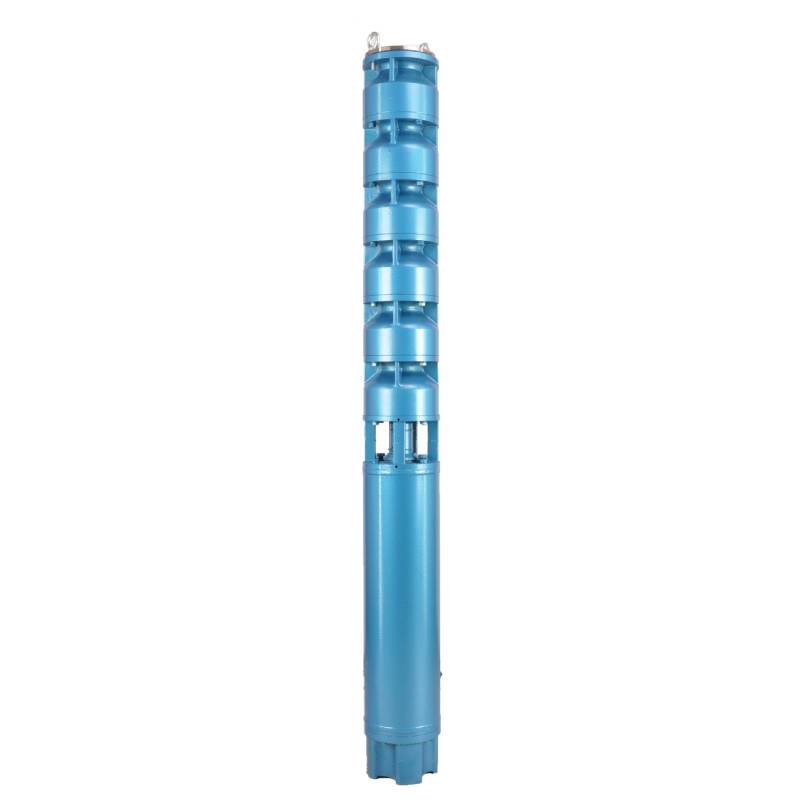Suitable for underground hot water mining with water temperature below 100°C, with heat resistance, corrosion resistance, aging resistance and other characteristics
This product is a powerful three-phase AC 380V (tolerance ± 5%), 50HZ (tolerance ± 1%) electric pump, suitable for all kinds of occasions need high-power pump. Its design considers a variety of water quality factors, including water temperature not higher than 20 °C, solid impurities content is not greater than 0.01%, PH value is 6.5-8.5, hydrogen sulfide content is not greater than 1.5mg/L, chloride ion content is not greater than 400mg/L, etc. The product adopts a closed or water immersion wet structure of the motor, before use in the submersible motor chamber filled with clean water to prevent empty fill. Requirements in strict accordance with the requirements of the matching cable and equipped with external overload protection device. To ensure stable operation, the submersible pump must be completely immersed in water operation, the insertion depth shall not exceed 70 meters, and the distance from the bottom of the well shall not be less than 3 meters. In addition, the pump shall not be a no-load test before start. In general, this product has the characteristics of high efficiency and stability, suitable for a variety of pump tasks in harsh environment.
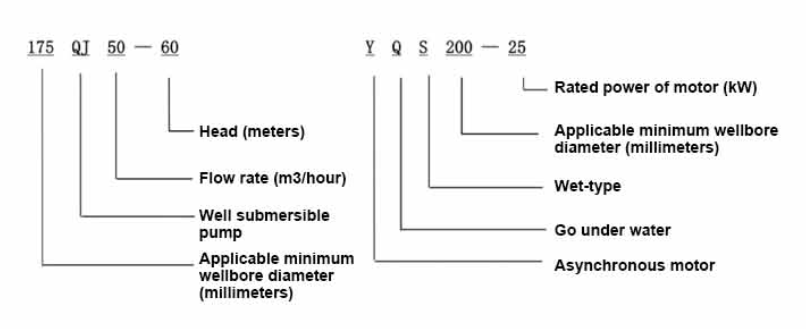
| Model | Llif (m3/h) | Pen (m) |
Cyflymder cylchdroi (newid/pwynt) |
Pwmp dŵr(%) | Allfa diamedr (mm) |
Yn berthnasol yn dda diamedr (mm) |
Wedi'i raddio pŵer (KW) |
Wedi'i raddio foltedd(V) |
Wedi'i raddio cerrynt (A) |
Effeithlonrwydd modur (%) | power factorcosφ | Uned Maint mwyaf rheiddiol (mm) |
Sylw | |||||||||
| 125QJ5-34 | 5 | 34 | 2850 | 53 | 40 | 125uchod | 1.5 | 380 | 4.23 | 70.0 | 0.77 | 118 | ||||||||||
| 125QJ5-51 | 51 | 2.2 | 6.03 | 72.0 | 0.77 | |||||||||||||||||
| 125QJ5-68 | 68 | 3 | 8.01 | 73.0 | 0.78 | |||||||||||||||||
| 125QJ5-85 | 85 | 4 | 10.53 | 74.0 | 0.78 | |||||||||||||||||
| 125QJ5-102 | 102 | 5.5 | 14.1 | 75.0 | 0.79 | |||||||||||||||||
| 125QJ5-119 | 119 | 5.5 | 14.1 | 75.0 | 0.79 | |||||||||||||||||
| 125QJ10-24 | 10 | 24 | 2850 | 60 | 50 | 125uchod | 1.5 | 380 | 4.23 | 70.0 | 0.77 | 118 | ||||||||||
| 125QJ10-32 | 32 | 2.2 | 6.03 | 72.0 | 0.77 | |||||||||||||||||
| 125QJ10-48 | 48 | 3 | 8.01 | 73.0 | 0.78 | |||||||||||||||||
| 125QJ10-56 | 56 | 4 | 10.53 | 74.0 | 0.78 | |||||||||||||||||
| 125QJ10-72 | 72 | 5.5 | 14.1 | 75.0 | 0.79 | |||||||||||||||||
| 125QJ10-80 | 80 | 5.5 | 14.1 | 75.0 | 0.79 | |||||||||||||||||
| 125QJ10-104 | 104 | 7.5 | 19.0 | 76.0 | 0.79 | |||||||||||||||||
| 125QJ10-120 | 10 | 120 | 2850 | 60 | 50 | 125uchod | 7.5 | 380 | 19.0 | 76.0 | 0.79 | 118 | ||||||||||
| 125QJ10-136 | 136 | 9.2 | 22.7 | 77.0 | 0.8 | |||||||||||||||||
| 125QJ15-36 | 15 | 36 | 2850 | 63 | 50 | 125uchod | 2.2 | 380 | 6.03 | 72.0 | 0.77 | 118 | ||||||||||
| 125QJ15-39 | 39 | 3 | 8.01 | 73.0 | 0.78 | |||||||||||||||||
| 125QJ15-46 | 46 | 4 | 10.53 | 74.0 | 0.78 | |||||||||||||||||
| 125QJ15-52 | 52 | 4 | 10.53 | 74.0 | 0.78 | |||||||||||||||||
| 125QJ15-59 | 59 | 5.5 | 14.1 | 75.0 | 0.79 | |||||||||||||||||
| 125QJ15-65 | 65 | 5.5 | 14.1 | 75.0 | 0.79 | |||||||||||||||||
| 125QJ15-78 | 78 | 7.5 | 19.0 | 76.0 | 0.79 | |||||||||||||||||
| 125QJ15-91 | 91 | 7.5 | 19.0 | 76.0 | 0.79 | |||||||||||||||||
| 125QJ15-104 | 104 | 9.2 | 22.7 | 77.0 | 0.8 | |||||||||||||||||
| 125QJ20-16 | 20 | 16 | 2850 | 64 | 50 | 125uchod | 2.2 | 380 | 6.03 | 72.0 | 0.77 | 118 | ||||||||||
| 125QJ20-24 | 24 | 3 | 8.01 | 73.0 | 0.78 | |||||||||||||||||
| 125QJ20-32 | 32 | 4 | 10.53 | 74.0 | 0.78 | |||||||||||||||||
| 125QJ20-40 | 40 | 4 | 10.53 | 74.0 | 0.78 | |||||||||||||||||
| 125QJ20-48 | 48 | 5.5 | 14.1 | 75.0 | 0.79 | |||||||||||||||||
| 125QJ20-56 | 56 | 5.5 | 14.1 | 75.0 | 0.79 | |||||||||||||||||
| 125QJ20-64 | 64 | 7.5 | 19.0 | 76.0 | 0.79 | |||||||||||||||||
| 125QJ20-72 | 72 | 7.5 | 19.0 | 76.0 | 0.79 | |||||||||||||||||
| 125QJ20-80 | 80 | 9.2 | 22.7 | 77.0 | 0.8 | |||||||||||||||||
| 125QJ25-12 | 25 | 12 | 2850 | 64 | 65 | 125uchod | 2.2 | 380 | 6.03 | 72.0 | 0.77 | 118 | ||||||||||
| 125QJ25-18 | 18 | 3 | 8.01 | 73.0 | 0.78 | |||||||||||||||||
| 125QJ25-24 | 24 | 4 | 10.53 | 74.0 | 0.78 | |||||||||||||||||
| 125QJ25-30 | 30 | 4 | 10.53 | 74.0 | 0.78 | |||||||||||||||||
| 125QJ25-36 | 36 | 5.5 | 14.1 | 75.0 | 0.79 | |||||||||||||||||
| 125QJ25-48 | 48 | 7.5 | 19.0 | 76.0 | 0.79 | |||||||||||||||||
| 125QJ25-60 | 60 | 9.2 | 22.7 | 77.0 | 0.8 | |||||||||||||||||
| 125QJ32-24 | 32 | 24 | 2850 | 64 | 80 | 125uchod | 4 | 380 | 10.53 | 74.0 | 0.78 | 118 | ||||||||||
| 125QJ32-30 | 30 | 5.5 | 14.1 | 75.0 | 0.79 | |||||||||||||||||
| 125QJ32-42 | 42 | 7.5 | 19.0 | 76.0 | 0.79 | |||||||||||||||||
| 125QJ32-54 | 54 | 9.2 | 22.7 | 77.0 | 0.8 | |||||||||||||||||
| 125QJ5-240 | 5 | 240 | 2850 | 40 | 125uchod | 11 | 380 | 26.28 | 118 | |||||||||||||
| 125QJ5-280 | 280 | 13 | 30.87 | |||||||||||||||||||
| 125QJ5-320 | 320 | 15 | 35.62 | |||||||||||||||||||
| 125QJ10-180 | 10 | 180 | 2850 | 50 | 125uchod | 11 | 380 | 26.28 | 118 | |||||||||||||
| 125QJ10-210 | 210 | 13 | 30.87 | |||||||||||||||||||
| 125QJ10-240 | 240 | 15 | 35.62 | |||||||||||||||||||
| 125QJ15-120 | 15 | 120 | 2850 | 50 | 125uchod | 11 | 380 | 26.28 | 118 | |||||||||||||
| 125QJ15-142 | 142 | 13 | 30.87 | |||||||||||||||||||
| 125QJ15-162 | 162 | 15 | 35.62 | |||||||||||||||||||
| 125QJ20-100 | 20 | 100 | 2850 | 50 | 125uchod | 11 | 380 | 26.28 | 118 | |||||||||||||
| 125QJ20-120 | 120 | 13 | 30.87 | |||||||||||||||||||
| 125QJ20-136 | 136 | 15 | 35.62 | |||||||||||||||||||
| 125QJ25-82 | 25 | 82 | 2850 | 65 | 125uchod | 11 | 380 | 26.28 | 118 | |||||||||||||
| 125QJ25-97 | 97 | 13 | 30.87 | |||||||||||||||||||
| 125QJ25-110 | 110 | 15 | 35.62 | |||||||||||||||||||
| 125QJ32-68 | 32 | 68 | 2850 | 80 | 125uchod | 11 | 380 | 26.28 | 118 | |||||||||||||
| 125QJ32-80 | 80 | 13 | 30.87 | |||||||||||||||||||
| 125QJ32-92 | 92 | 15 | 35.62 | |||||||||||||||||||
| 125QJ40-46 | 40 | 46 | 2850 | 80 | 125uchod | 11 | 380 | 26.28 | 118 | |||||||||||||
| 125QJ40-54 | 54 | 13 | 30.87 | |||||||||||||||||||
| 125QJ40-62 | 62 | 15 | 35.62 | |||||||||||||||||||
1, well submersible pump for clean water pump, prohibit the new well, pumping sediment and muddy water,
2, well water pump voltage grade of 380/50HZ, the use of other voltage grades of submersible motors need to be customized. The underground cable must use waterproof cable, must be equipped with starting equipment, such as distribution box, start not ready should have commonly used motor comprehensive protection function, such as short circuit overload protection, phase protection, undervoltage protection, grounding protection, idling protection, in case of abnormal conditions, the protection device should be timely action trip.
3, the installation and use of the pump must be reliably grounded, prohibit the push and pull switch when the hands and feet are wet, the installation and maintenance of the pump must be cut off the power supply, the use of the pump place to set up "to prevent electric shock" obvious signs:
4, down the well or before installation, the motor cavity must be filled with distilled water or non-corrosive clean cold boiling water, tighten the / water bolt, the pump on the ground test run, must be to the pump chamber water lubrication rubber bearings, instant start not more than a second, see whether the steering is the same as the steering instructions. When the pump is upright, pay attention to safety, prevent overturning injury.
5, strictly according to the provisions of the pump lift, flow range of use, to prevent low flow or high lift pumping force, the thrust bearing and other parts of the wear, the motor overload burned 6, after the pump down the well, the measurement of the motor to the ground insulation resistance should not be less than 100M, after the start to observe the voltage and current, check the motor winding insulation, whether in line with the requirements; pump storage location temperature if less than freezing point, should be dry the water in the motor cavity, prevent the motor cavity water ice damage caused by low temperature.
The pump parts are mainly composed of pump shaft, impeller, shunt shell, rubber bearing, check valve body (optional) and other components. The motor part is mainly composed of base, pressure regulating diaphragm, thrust bearing, thrust plate, lower guide bearing seat, stator, rotor, upper guide bearing seat, sand discharging ring, water inlet section, lead cable and other components. The motor is a water-filled submersible three-phase asynchronous motor, which is filled with water to cool the motor and lubricate the bearing. The pressure regulating diaphragm at the bottom is used to adjust the difference in internal water expansion and contraction pressure caused by the temperature rise of the motor. In order to prevent the sand in the well water from entering the motor, two oil seals are installed at the upper end of the motor shaft extension, and a sand discharging ring is installed to form a sand discharging structure. In order to prevent the pump shaft from jumping when starting, the pump shaft is connected with the motor shaft through a coupling, and a thrust bearing is installed at the lower part of the motor. The lubrication of the motor and the pump bearing is water lubrication. The stator winding of the motor adopts high quality submersible motor winding wire, with high insulation performance. The pump adopts computer CAD design, with simple structure and excellent technical performance.

(1) Paratoi cyn gosod:
1. Gwiriwch a yw'r pwmp tanddwr yn bodloni'r amodau defnydd a'r cwmpas a nodir yn y llawlyfr.
2. Gan ddefnyddio gwrthrych trwm gyda diamedr sy'n hafal i diamedr allanol uchaf y pwmp tanddwr, mesurwch a all diamedr mewnol y ffynnon ffitio'r pwmp tanddwr, a mesur a yw dyfnder y ffynnon yn bodloni'r gofynion gosod.
3. Gwiriwch a yw tyllu'r ffynnon yn lân ac a yw dŵr y ffynnon yn gymylog. Peidiwch byth â defnyddio pwmp trydan tanddwr i olchi mwd y pwmp welor a dŵr tywod er mwyn osgoi niwed cynamserol i'r pwmp trydan tanddwr.
4. Gwiriwch a yw lleoliad y clamp gosod welhead yn addas ac a all wrthsefyll ansawdd yr uned gyfan
5. Gwiriwch a yw'r cydrannau pwmp tanddwr wedi'u cwblhau a'u gosod yn iawn yn ôl y diagram cydosod yn y llawlyfr Tynnwch y sgrin hidlo a chylchdroi'r cyplydd i weld a yw'n cylchdroi yn hyblyg
6. Dadsgriwiwch y sgriw dŵr a llenwi'r ceudod modur â dŵr glân nad yw'n cyrydol (noder. gwnewch yn siŵr ei ffiltro), yna tynhau'r sgriw dŵr. Ar ôl 12 awr o chwistrelliad dŵr, ni ddylai ymwrthedd inswleiddio'r modur fod yn llai na 150M Q wrth ei fesur gyda bwrdd ysgwyd 500V.
7. Cable joint, cut off a 120mm rubber sleeve from one end of the outgoing cable and the matching cable with an electrician's knifethen stagger the length of the three core wires in a stepped shape, peel off a 20mm copper core, scrape of the oxide layer on theoutside of the copper wire with a knife or sand cloth, and insert the two connected wire ends in palirs.After tying the layer tightly with fine copper wire, solder it thoroughly and firmly, and sand of any. burrs on the surface. Then, forthe three joints, use polyvester insulation tape to wrap them in a semi stacked manner for three lavers. Wrap the two ends of thewrapping layer tightywith nyion thread,and then use a semi stacked method to wrap the tape for three layers. Wrap the outellayer with high-pressure insulation tape for three layers. Finally, fold the threestrands together and repeatedly wrap them for fivelayers with high-pressure tape. Each layer must be tightly tied, and the interlayer joints must be tight and fimm to prevent water frompenetrating and damaging the insulation, After wrapping, soak in water at room temperature of 20 ’c for 12 hours, and measurethe insulation resistance with a shaking table, which should not be less than 100M Ω
Mae'r diagram proses gwifrau cebl ynghlwm fel a ganlyn: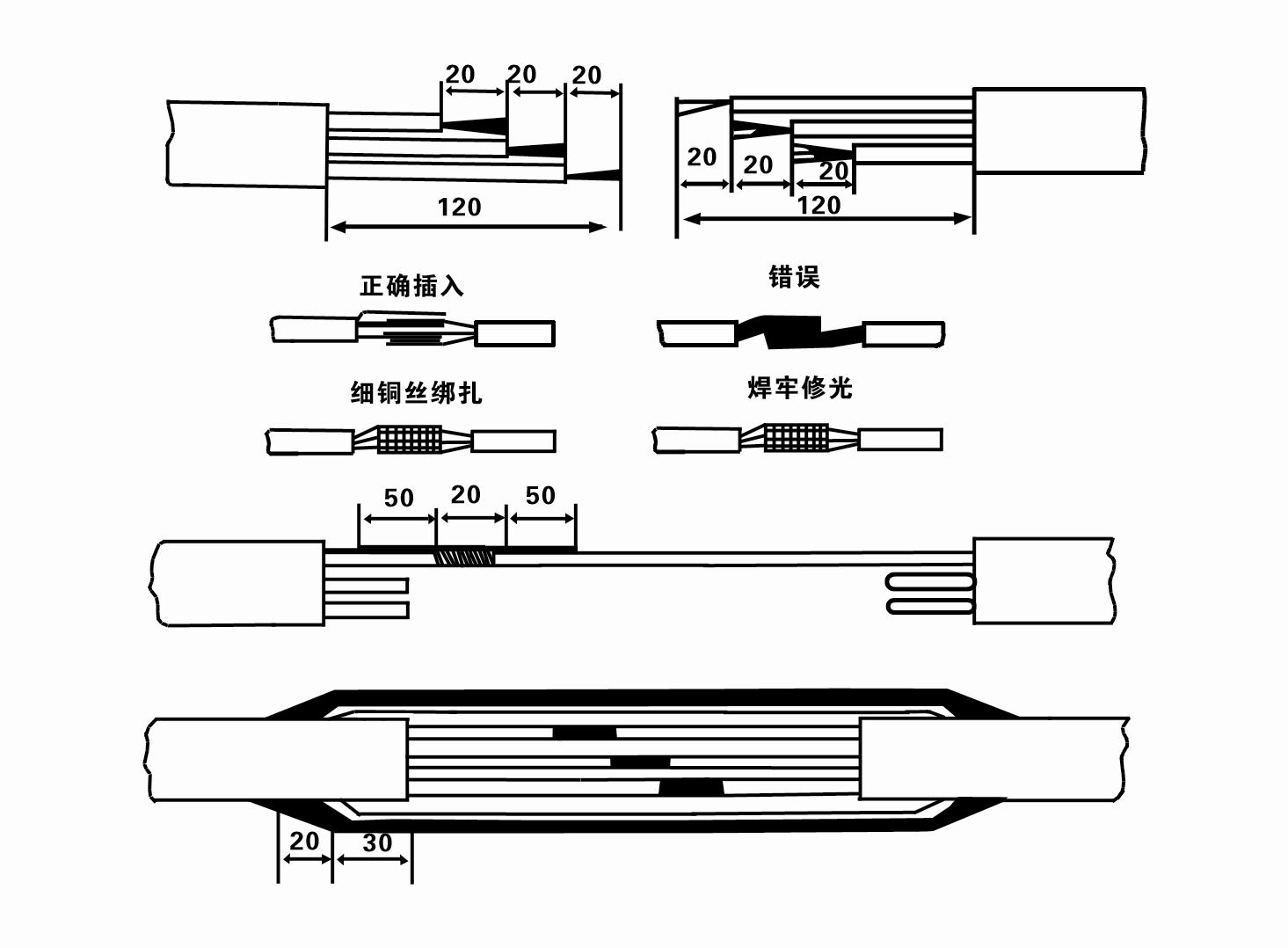
8. Defnyddiwch amlfesurydd i wirio a yw'r gwifrau tri cham wedi'u cysylltu ac a yw'r gwrthiant DC yn gyfartal yn fras.
9. Gwiriwch a yw'r cylched a chynhwysedd y trawsnewidydd yn cael eu gorlwytho, ac yna cysylltu'r switsh amddiffyn gorlwytho neu'r offer cychwyn. Gweler Tabl 2 am fodelau penodol, ac yna Arllwyswch bwced o ddŵr i'r pwmp dŵr o'r allfa pwmp dŵr i iro'r Bearings rwber yn y pwmp, ac yna gosodwch y pwmp trydan tanddwr yn unionsyth ac yn gyson.Start (dim mwy nag un eiliad) a gwirio a yw'r cyfeiriad llywio yn gyson â'r arwydd llywio. Os na, cyfnewidiwch unrhyw ddau gysylltydd o'r cebl tri cham. Yna gosodwch yr hidlydd a pharatowch i fynd i lawr y ffynnon. Os caiff ei ddefnyddio mewn achlysuron arbennig (fel ffosydd, ffosydd, afonydd, pyllau, pyllau, ac ati), rhaid i'r pwmp trydan gael ei seilio'n ddibynadwy.
(2) Offer ac offer gosod:
1. Un pâr o gadwyni codi am fwy na dwy dunnell.
2. Trybedd gydag uchder fertigol o ddim llai na phedwar metr.
3. Dau raff hongian (rhaffau gwifren) sy'n gallu dwyn pwysau o fwy nag un tunnell (gall ddwyn pwysau set gyflawn o bympiau dŵr).
4. Gosod dau bâr o clampiau (splints).
5. Wrenches, morthwylion, sgriwdreifers, offer trydanol ac offerynnau, ac ati.
(3) Gosod pwmp trydan:
1. Dangosir diagram gosod y pwmp trydan tanddwr yn Ffigur 2. Dangosir y dimensiynau gosod penodol yn Nhabl 3 "Rhestr o Dimensiynau Gosod y Pwmp Trydan Tanddwr".
2. Gellir codi pympiau trydan tanddwr â phen llai na 30 metr yn uniongyrchol i'r ffynnon gan ddefnyddio pibellau a rhaffau gwifren neu rhaffau cywarch eraill a all ddwyn pwysau llawn y peiriant cyfan, pibellau dŵr, a dŵr yn y pibellau.
3. Mae pympiau â phen o fwy na 30 metr yn defnyddio pibellau dur, ac mae'r dilyniant gosod fel a ganlyn:
①Defnyddiwch clamp i glampio pen uchaf rhan y pwmp dŵr (mae'r modur a'r pwmp dŵr wedi'u cysylltu ar hyn o bryd), codwch ef â chadwyn hongian, a'i glymu'n araf i mewn i'r ffynnon nes i chi roi'r clamp ar ben y ffynnon a thynnu'r cadwyn hongian.
② Defnyddiwch bâr arall o clampiau i glampio pibell, ei godi â chadwyn hongian 15 cm i ffwrdd o'r fflans, a'i ostwng yn araf. Rhwng fflans pibell a fflans pwmp Rhowch y pad rwber yn ei le a thynhau'r bibell a'r pwmp yn gyfartal â bolltau, cnau a wasieri gwanwyn.
③ Codwch y pwmp tanddwr ychydig, tynnwch y clamp ar ben uchaf y pwmp dŵr, clymwch y cebl yn gadarn i'r bibell ddŵr gyda thâp plastig, a'i glymu'n araf nes bod y clamp wedi'i osod ar ben y ffynnon.
④ Defnyddiwch yr un dull i glymu'r holl bibellau dŵr i'r ffynnon.
⑤ Ar ôl i'r cebl plwm-allan gael ei gysylltu â'r switsh rheoli, mae'n gysylltiedig â'r cyflenwad pŵer tri cham.
(4) Pethau i'w nodi yn ystod y gosodiad:
1. Os canfyddir ffenomen jamio yn ystod y broses bwmpio, trowch neu tynnwch y bibell ddŵr i oresgyn y pwynt jamio. Os nad yw mesurau amrywiol yn gweithio o hyd, peidiwch â gorfodi'r pwmp i lawr er mwyn osgoi difrod i'r pwmp trydan tanddwr a'r ffynnon.
2. Yn ystod y gosodiad, dylid gosod pad rwber ar fflans pob pibell a'i dynhau'n gyfartal.
3. Pan fydd y pwmp dŵr yn cael ei ostwng i'r ffynnon, dylid ei osod yng nghanol pibell y ffynnon i atal y pwmp rhag rhedeg yn erbyn wal y ffynnon am amser hir, gan achosi'r pwmp i ddirgrynu a'r modur i ysgubo a llosgi .
4. Darganfyddwch ddyfnder y pwmp dŵr i waelod y ffynnon yn ôl amodau tywod a silt y ffynnon sy'n llifo. Peidiwch â chladdu'r pwmp yn y mwd. Yn gyffredinol, nid yw'r pellter o'r pwmp dŵr i waelod y ffynnon yn llai na 3 metr (gweler Ffigur 2).
5. Ni ddylai dyfnder mynediad dŵr y pwmp dŵr fod yn llai na 1-1.5 metr o lefel y dŵr deinamig i'r nod mewnfa dŵr (gweler Ffigur 2). Fel arall, gall y Bearings pwmp dŵr gael eu niweidio'n hawdd.
6. Ni all lifft y pwmp dŵr fod yn rhy isel. Fel arall, mae angen gosod falf giât ar bibell ddŵr y ffynnon i reoli llif y pwmp ar y pwynt llif graddedig i atal y modur rhag cael ei orlwytho a'i losgi oherwydd cyfraddau llif mawr.
7. Pan fydd y pwmp dŵr yn rhedeg, dylai'r allbwn dŵr fod yn barhaus a hyd yn oed, dylai'r presennol fod yn sefydlog (o dan amodau gwaith graddedig, yn gyffredinol dim mwy na 10% o'r cerrynt graddedig), ac ni ddylai fod unrhyw ddirgryniad na sŵn. Os oes unrhyw annormaledd, dylid stopio'r peiriant i ddarganfod yr achos a'i ddileu.
8. Wrth osod, rhowch sylw i osodiad y wifren sylfaen modur (gweler Ffigur 2). Pan fydd y bibell ddŵr yn bibell ddur, ei harwain o'r clamp pen ffynnon; pan fydd y bibell ddŵr yn bibell blastig, ei arwain o farc sylfaen y pwmp trydan.
- (1)With the continuous development of modern technology, submersible pumps play a crucial role in the field of pumps. After installing the submersible pump, check the insulation resistance and three-phase continuity repeatedly to ensure that there are no errors in the connection between the instrument and the starting equipment. If everything is normal, the test equipment can be started. After starting, observe whether the indication readings of each instrument are correct. If the rated voltage and current specified on the nameplate are exceeded, pay attention to observe whether the pump has any noise or vibration. If everything is normal, it can be put into operation. After the pump runs for four hours for the first time, it should be closed and the thermal insulation resistance of the motor should be tested quickly, and its value should not be less than 0.5 megaohms. After stopping the pump, restart it after five minutes to prevent the water column in the pipeline from completely reversing, resulting in the motor burning due to overcurrent. After the pump is running normally, in order to prolong its service life, it is necessary to check regularly whether the supply voltage, working current and insulation resistance are normal. If the following conditions are found, the equipment should be shut down immediately to troubleshoot. The current exceeds 20% under the rated working conditions; the dynamic water level drops to the inlet section, resulting in intermittent drainage; the submersible pump vibrates violently or makes noisy sounds; the supply voltage is lower than 340 volts; any fuse is broken; the water pipe is damaged; The thermal insulation resistance between the motor and the ground is less than 0.5 megaohm.These recommended operating procedures and safety measures ensure the safe operation of the submersible pump, prolong the service life of the equipment, and provide users with a reliable pump choice.
- (2)Unit disassembly:
- 1 untie the cable tie, remove the pipeline part, remove the wire plate.
- 2 unscrew the water release bolt, put the water in the motor chamber.
- 3 remove the filter, loose the fixing screw of the motor shaft on the coupling.
- 4 unscrew the bolt connecting the water inlet section with the motor, and separate the pump from the motor (pay attention to the unit cushion when separating, to prevent the bending of the pump shaft)
- 5 the disassembly sequence of the pump is: (see figure 1) water inlet section, impeller, diversion shell, impeller...... check valve body, when removing the impeller, use special tools to loosen the conical sleeve of the fixed impeller first, and avoid bending the pump shaft and various bumps in the disassembly process.
- 6 the disassembly process of the motor is: (see figure 1) place the motor on the platform, and remove the nut, base, shaft head lock nut, thrust plate, key, lower guide bearing seat, double head bolt from the bottom of the motor in turn. Then take out the rotor (pay attention not to damage the wire package) and finally remove the connecting section and upper guide bearing seat.
- 7 unit assembly: Before assembly, the rust and dirt of the parts should be cleaned, and the mating surfaces and fasteners should be coated with sealant. Then they should be assembled in the reverse order of disassembly (the up and down momentum of the motor shaft is about 1 mm after assembly). After assembly, the coupling should be flexible, and then the filter screen test machine.
- (3)The submersible pump should be dismantled and repaired according to Article 5 for each operation year, or less than one year, but the submersible time has reached two years, and the worn parts should be replaced.
1, rhowch y dŵr allan yn y ceudod modur (yn enwedig yn y gaeaf i atal y modur rhag rhewi), a chlymwch y cebl yn dda.
2, store in an indoor room without corrosive substances and gases, with a temperature below 40 °C.
3, dylai defnydd hirdymor roi sylw i atal rhwd pympiau tanddwr.
- Impeller
- Llawes siafft
- Llawes siafft rwber
-
Modrwy selio
01 Cymeriant dŵr ffynnon dwfn
02 Cyflenwad dŵr uchel
03 cyflenwad dŵr mynydd
04 twr dwr
05 Dyfrhau amaethyddol
06 dyfrhau gardd
07 cymeriant dŵr afon
08 dŵr domestig

